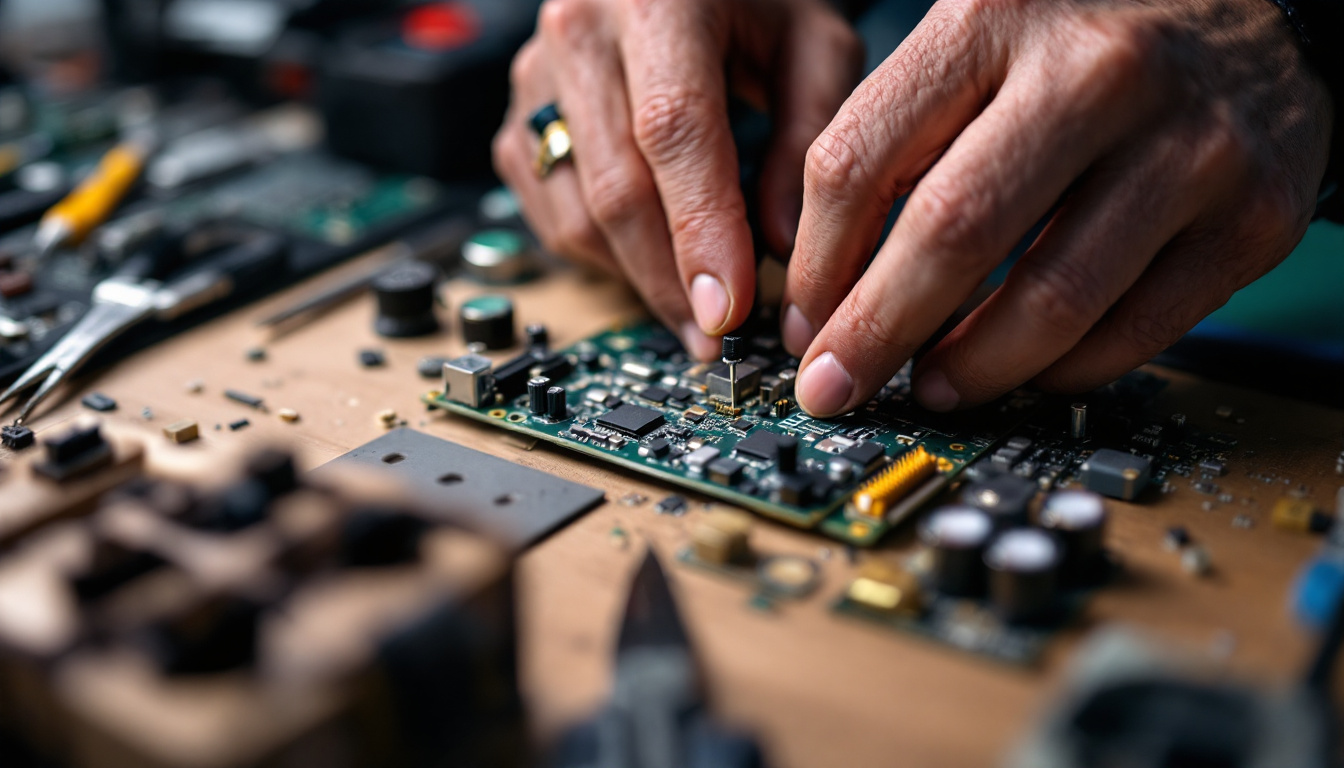How to Become a Successful Hardware Engineer: A Comprehensive Guide
How to Become a Successful Hardware Engineer: A Comprehensive Guide
In today's technology-driven world, hardware engineers play a crucial role in designing, developing, and testing computer hardware components. As the backbone of modern computing, their expertise is essential for creating everything from personal computers to sophisticated embedded systems. This comprehensive guide explores the steps and skills necessary to become a successful hardware engineer, providing insights into education, practical experience, and career development.
Understanding the Role of a Hardware Engineer
Before embarking on a career in hardware engineering, it is important to understand the various responsibilities associated with the role. Hardware engineers are involved in the design and development of physical components such as circuit boards, processors, and memory devices. They work closely with software engineers to ensure that hardware and software systems function seamlessly together. This collaboration is crucial, as the performance of hardware can significantly impact the efficiency and capabilities of software applications, making the synergy between these two fields essential for innovation.
Key Responsibilities
The primary responsibilities of a hardware engineer include:
- Designing and testing hardware components to meet specific requirements.
- Collaborating with cross-functional teams to develop integrated systems.
- Conducting research to innovate and improve existing hardware technologies.
- Documenting designs and processes for future reference and compliance.
In addition to these tasks, hardware engineers must also stay updated on industry trends and advancements in technology to remain competitive in their field. This involves attending workshops, participating in professional organizations, and engaging in continuous learning through online courses or certifications. The rapid pace of technological advancement means that hardware engineers must be adaptable, often learning new programming languages or design tools to keep up with evolving industry standards.
Work Environments
Hardware engineers can find employment in a variety of settings, including:
- Technology companies focused on consumer electronics.
- Aerospace and defense organizations.
- Automotive manufacturers developing advanced driver-assistance systems.
- Research institutions and universities.
The work environment can vary significantly, from collaborative team settings to more independent roles focused on research and development. In fast-paced tech companies, hardware engineers may work in open-plan offices that foster communication and creativity, while in research institutions, they might find themselves in labs equipped with cutting-edge technology, focusing on long-term projects that push the boundaries of current knowledge. Additionally, hardware engineers often have the opportunity to participate in field testing, where they can see their designs in action and gather valuable feedback for further improvements.
Educational Pathways
Becoming a hardware engineer typically requires a solid educational foundation. Most professionals in the field hold at least a bachelor's degree in electrical engineering, computer engineering, or a related discipline. Here are the key educational steps to consider:
Undergraduate Degree
A bachelor's degree is the minimum requirement for most hardware engineering positions. Coursework typically includes subjects such as:
- Digital and analog circuit design
- Microprocessors and microcontrollers
- Signal processing
- Computer architecture
Hands-on laboratory experience is also crucial, as it allows students to apply theoretical knowledge in practical settings. Many universities offer design projects and internships that can further enhance a student's understanding of real-world applications. Participating in engineering clubs or competitions, such as robotics contests or hackathons, can also provide invaluable experience and foster teamwork skills, which are essential in collaborative engineering environments.
Advanced Degrees
While not always necessary, pursuing a master's degree or Ph.D. can provide a competitive edge, especially for those interested in research or specialized areas of hardware engineering. Advanced degrees often allow for deeper exploration of topics such as:
- Embedded systems
- VLSI design
- Robotics
These programs can also offer opportunities for networking and collaboration with industry professionals, enhancing career prospects. Graduate studies often involve rigorous research projects, which can lead to published papers and presentations at conferences, further establishing a professional's credibility in the field. Additionally, many graduate programs emphasize interdisciplinary approaches, allowing students to work alongside peers from computer science, mechanical engineering, and other fields, thus broadening their skill set and perspective on hardware design challenges.
Essential Skills for Hardware Engineers
In addition to formal education, hardware engineers must develop a diverse skill set to excel in their roles. Here are some essential skills to cultivate:

Technical Skills
Technical proficiency is paramount in hardware engineering. Key skills include:
- Proficiency in hardware description languages (HDLs) such as VHDL or Verilog.
- Familiarity with electronic design automation (EDA) tools.
- Understanding of circuit simulation software.
These skills enable engineers to design and test complex hardware systems effectively.
Problem-Solving Abilities
Hardware engineers often encounter challenges that require innovative solutions. Strong problem-solving skills are essential for troubleshooting issues and optimizing designs. This involves:
- Analyzing data to identify potential problems.
- Developing creative solutions to overcome technical hurdles.
- Testing and iterating on designs based on feedback and results.
Communication and Collaboration
Given the collaborative nature of hardware engineering, effective communication is vital. Engineers must be able to:
- Clearly articulate technical concepts to non-technical stakeholders.
- Work effectively within multidisciplinary teams.
- Document designs and processes comprehensively.
Strong interpersonal skills can greatly enhance teamwork and project success.
Gaining Practical Experience
While education provides the foundational knowledge necessary for a career in hardware engineering, practical experience is equally important. Here are some ways to gain hands-on experience:
Internships and Co-ops
Participating in internships or cooperative education programs during college can provide invaluable experience. These opportunities allow students to:
- Apply theoretical knowledge in real-world settings.
- Network with industry professionals.
- Gain insights into the day-to-day responsibilities of hardware engineers.
Internships often lead to job offers upon graduation, making them a strategic step in career development.
Personal Projects
Engaging in personal projects can also enhance skills and showcase creativity. Building custom hardware projects, participating in hackathons, or contributing to open-source initiatives can:
- Demonstrate technical proficiency to potential employers.
- Provide opportunities to experiment with new technologies.
- Build a portfolio that highlights design and problem-solving abilities.
Networking and Professional Organizations
Joining professional organizations such as the Institute of Electrical and Electronics Engineers (IEEE) can facilitate networking and professional growth. These organizations often provide:
- Access to industry conferences and workshops.
- Opportunities for mentorship.
- Resources for continuing education and certification.
Networking can lead to job opportunities and collaborations that enhance career prospects.
Staying Current in the Field
The field of hardware engineering is constantly evolving, with new technologies and methodologies emerging regularly. To remain competitive, engineers must commit to lifelong learning. Here are some strategies to stay current:
Continuing Education
Many professionals choose to pursue additional certifications or courses to enhance their skills. Online platforms and local universities offer a variety of options, including:
- Specialized courses in emerging technologies such as IoT or AI.
- Certifications in specific software tools or methodologies.
- Workshops focused on hands-on skills development.
Continuing education not only improves technical skills but also demonstrates a commitment to professional growth.
Industry Publications and Conferences
Reading industry publications and attending conferences can provide insights into the latest trends and advancements. Subscribing to journals, blogs, and newsletters can help engineers stay informed about:
- New technologies and tools.
- Best practices in hardware design and development.
- Case studies showcasing innovative engineering solutions.
Engaging with Online Communities
Participating in online forums and communities can also be beneficial. Platforms such as GitHub, Stack Overflow, and specialized engineering forums allow professionals to:
- Share knowledge and seek advice from peers.
- Collaborate on projects and contribute to open-source initiatives.
- Stay updated on industry news and job opportunities.
Career Advancement Opportunities
A successful career in hardware engineering can lead to various advancement opportunities. As engineers gain experience and expertise, they may consider the following paths:

Specialization
Many hardware engineers choose to specialize in a particular area, such as:
- Embedded systems design
- FPGA development
- Power electronics
Specialization can enhance job prospects and lead to higher salaries, as employers often seek experts in niche areas.
Management Roles
For those interested in leadership, transitioning into management roles can be a rewarding path. This may involve overseeing engineering teams, managing projects, or coordinating cross-functional initiatives. Skills necessary for success in management include:
- Project management and organizational skills.
- Ability to motivate and lead teams.
- Strong decision-making capabilities.
Entrepreneurship
Some hardware engineers may choose to start their own businesses or consult as independent contractors. This path allows for greater creativity and autonomy, but also requires strong business acumen and risk management skills. Entrepreneurs in hardware engineering often focus on:
- Developing innovative products or solutions.
- Identifying market needs and creating viable business models.
- Building and managing teams to execute their vision.
Conclusion
Becoming a successful hardware engineer requires a combination of education, practical experience, and continuous learning. By understanding the role, acquiring the necessary skills, and staying current with industry trends, aspiring engineers can build a rewarding career in this dynamic field. Whether through specialization, management, or entrepreneurship, the opportunities for growth and innovation in hardware engineering are vast. With dedication and a commitment to excellence, a successful career in hardware engineering is well within reach.
